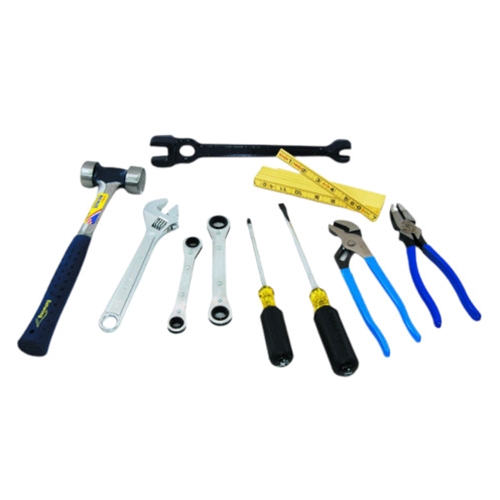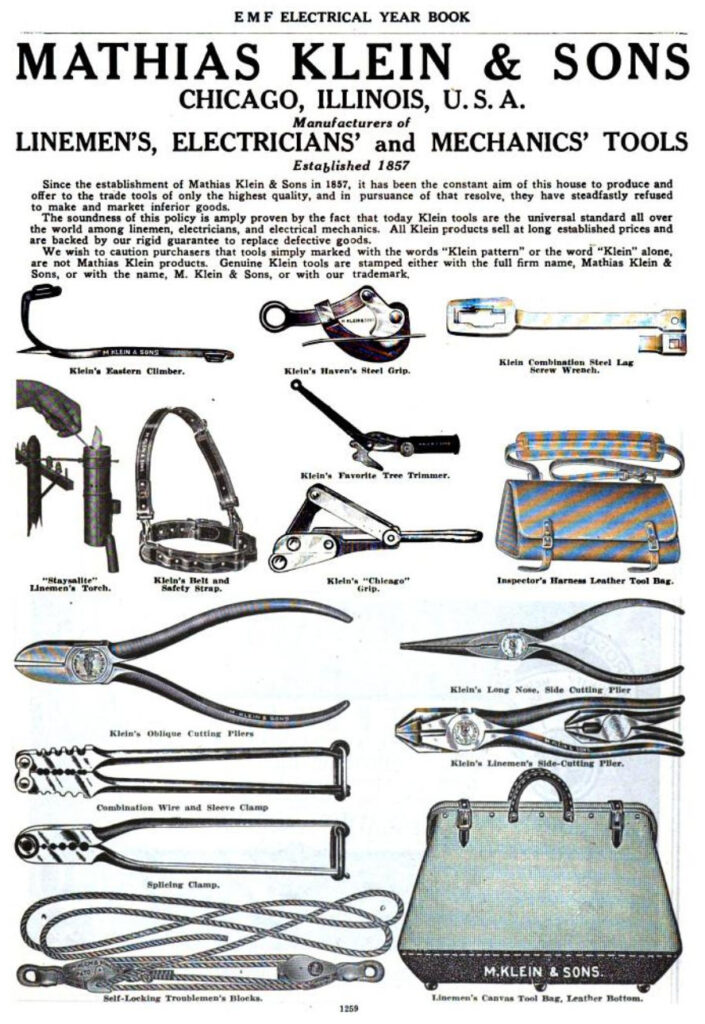Lineman tools include climbing gear, pliers, and voltage detectors. These tools are essential for safety and efficiency.
Lineman tools are crucial for professionals working with electrical systems. Essential tools include climbing gear, such as harnesses and spikes, which ensure safe pole ascents. Pliers, especially high-leverage ones, are vital for cutting and manipulating wires. Voltage detectors help identify live wires, preventing accidents.
Additionally, ratchet wrenches and cable cutters are indispensable for handling heavy-duty tasks. These tools not only enhance safety but also improve work efficiency. Using the right tools ensures that linemen can perform their duties effectively, minimizing risks and maximizing productivity. Therefore, investing in high-quality lineman tools is essential for any electrical professional.

Credit: www.reddit.com
Basic Hand Tools
Every lineman needs a reliable set of basic hand tools. These tools are essential for daily tasks and ensure safety and efficiency. Below, we will explore the key basic hand tools every lineman should have.
Pliers
Pliers are versatile and essential for gripping, twisting, and cutting wires. Linemen often use needle-nose pliers for precision tasks. Side-cutting pliers are great for cutting wires. Linemen’s pliers are robust and suitable for heavy-duty tasks.
- Needle-nose pliers
- Side-cutting pliers
- Linemen’s pliers
Screwdrivers
Screwdrivers are vital for assembling and disassembling various components. Linemen should have a set of flat-head and Phillips screwdrivers. Insulated screwdrivers provide extra safety when working with electricity. These screwdrivers protect linemen from electric shocks.
- Flat-head screwdrivers
- Phillips screwdrivers
- Insulated screwdrivers
Wrenches
Wrenches are crucial for tightening and loosening nuts and bolts. Every lineman should have a set of adjustable wrenches. These wrenches can fit various sizes of nuts and bolts. Socket wrenches are also important for quick and efficient tasks. They offer more torque and ease of use.
- Adjustable wrenches
- Socket wrenches
Climbing Gear
Climbing gear is crucial for linemen. It ensures safety and efficiency while working on heights. The right gear prevents falls and provides stability. Let’s explore some essential climbing tools.
Climbing Belts
Climbing belts are vital for linemen. These belts offer support and stability. They are worn around the waist. Climbing belts have slots for tools. They help linemen carry tools easily.
| Feature | Benefit |
|---|---|
| Adjustable Straps | Ensure a snug fit |
| Tool Slots | Easy access to tools |
| Sturdy Material | Long-lasting and durable |
Safety Harnesses
Safety harnesses are another essential tool. They protect linemen from falls. Harnesses have multiple attachment points. These points connect to ropes and anchors. Safety harnesses distribute weight evenly.
- Multiple connection points
- Comfortable padding
- Quick-release buckles
A good harness should have comfortable padding. Quick-release buckles make it easy to wear and remove. Safety harnesses should meet safety standards.
Cutting Tools
Cutting tools are essential for any lineman. These tools help in cutting wires, cables, and other materials. Having the right cutting tools ensures safety and efficiency on the job. Let’s explore some key cutting tools for linemen.
Cable Cutters
Cable cutters are crucial for cutting thick cables. They offer clean cuts without fraying the wires. Linemen use them to cut copper, aluminum, and steel cables.
| Tool | Material | Features |
|---|---|---|
| Standard Cable Cutters | Steel | Sharp blades, ergonomic handles |
| Ratchet Cable Cutters | Hardened Steel | One-handed operation, high leverage |
| Hydraulic Cable Cutters | High-grade Steel | Hydraulic power, cuts large cables |
Utility Knives
Utility knives are versatile tools for linemen. They help in cutting ropes, insulation, and other materials. These knives are compact and easy to carry.
- Fixed Blade Utility Knives: Strong, durable, non-retractable blades
- Retractable Blade Utility Knives: Safety feature, blade retracts when not in use
- Folding Utility Knives: Portable, safe, foldable design
Choosing the right cutting tool is vital. It ensures the job is done safely and efficiently. Always keep these tools in good condition.
Measurement Tools
Lineman tools are essential for safety and efficiency. Measurement tools help linemen ensure precision in their work. These tools are vital for accurate measurements and readings. Let’s explore some of the key measurement tools used by linemen.
Tape Measures
Tape measures are vital for measuring distances. They help linemen gauge the length of cables and wires. Tape measures come in various lengths, typically ranging from 25 to 100 feet. They are durable and often feature a retractable mechanism.
- Steel Tape Measures: Known for their durability and accuracy.
- Fiberglass Tape Measures: Lightweight and non-conductive.
- Digital Tape Measures: Provide precise electronic readings.
Voltage Testers
Voltage testers are crucial for safety. They help linemen check if a wire is live. Voltage testers come in different types, each with unique features.
| Type | Description |
|---|---|
| Non-Contact Voltage Testers | Detect voltage without touching the wire. |
| Multimeters | Measure voltage, current, and resistance. |
| Clamp Meters | Check current flow without disconnecting the wire. |
Both tape measures and voltage testers are indispensable for linemen. They ensure accuracy and safety in every task. Selecting the right tools can make a significant difference in the field.
Specialized Equipment
Specialized equipment is essential for linemen to perform their tasks safely and efficiently. These tools are designed to handle specific challenges in the field. Below, we will explore two key pieces of specialized equipment: hot sticks and load break tools.
Hot Sticks
Hot sticks are crucial for working on live electrical lines. They provide insulation to protect linemen from high voltage. Here are some types of hot sticks:
- Telescoping Hot Sticks: These can extend to various lengths.
- Shotgun Sticks: Used to grip and operate equipment from a distance.
- Switch Sticks: Specifically for opening and closing switches.
Hot sticks are made from high-quality fiberglass. This material ensures durability and safety. Regular inspection and maintenance are necessary to keep them in top condition.
Load Break Tools
Load break tools are used to interrupt electrical loads safely. These tools allow linemen to disconnect and connect lines under load. Below are some common types:
| Tool Type | Function |
|---|---|
| Load Break Switches | Enable safe load interruption and reconnection. |
| Load Break Elbows | Connect and disconnect cables in underground systems. |
| Load Break Tools | Provide a manual method for load interruption. |
Using load break tools correctly is vital for linemen’s safety. Training and practice ensure proper handling and efficiency. Regular checks help in maintaining their functionality.

Credit: www.reddit.com
Protective Gear
Working as a lineman involves many risks. Protective gear is crucial for safety. Every lineman needs proper equipment to stay safe and efficient. Here, we will focus on two essential pieces: gloves and helmets.
Gloves
Gloves are a must-have for linemen. They offer protection against electrical shocks. They also protect hands from cuts and abrasions.
| Type of Gloves | Features |
|---|---|
| Rubber Insulating Gloves | Protects against electrical shocks. Must be tested regularly. |
| Leather Protectors | Worn over rubber gloves. Provides extra durability and protection. |
Always choose gloves that fit well. Ill-fitting gloves can be dangerous. Check gloves for damage before each use.
Helmets
Helmets are essential for head protection. They guard against falling objects and electrical hazards. A good helmet can save a life.
Here are some key features of lineman helmets:
- Electrical Insulation: Protects against electrical hazards.
- Impact Resistance: Shields head from falling objects.
- Comfort: Must be comfortable for long wear.
Helmets should have a chin strap for a secure fit. Regularly inspect helmets for cracks or damage. Replace helmets if they are compromised.
Both gloves and helmets are vital for a lineman’s safety. Always use high-quality, well-maintained gear.
Maintenance And Storage
Proper maintenance and storage of lineman tools ensure their longevity and performance. Regular care and organized storage not only keep the tools in good condition but also enhance safety. Below, we delve into essential aspects of maintaining and storing lineman tools.
Tool Bags
A durable tool bag is crucial for linemen. It keeps tools organized and protected. Look for bags with multiple compartments. This helps in easy access and quick identification. A good tool bag should be made of strong material. Leather or heavy-duty nylon are excellent choices.
| Feature | Benefit |
|---|---|
| Multiple Compartments | Keeps tools organized |
| Durable Material | Ensures longevity |
| Comfortable Straps | Easy to carry |
Cleaning And Care
Regular cleaning and care extend the life of lineman tools. After each use, wipe tools with a clean cloth. Remove any dirt and moisture. This prevents rust and corrosion.
- Use a wire brush for stubborn dirt.
- Apply a light coat of oil to metal parts.
- Store in a dry place to avoid moisture.
Always inspect tools for any damage. Replace worn-out parts immediately. This ensures safety and efficiency during use.

Credit: www.jharlen.com
Frequently Asked Questions
What Tools Does A Lineman Use?
Lineman tools include insulated pliers, wire cutters, climbing gear, voltage testers, wrenches, screwdrivers, and safety harnesses.
What Gear Do Linemen Need?
Linemen need personal protective equipment, including helmets, gloves, safety glasses, and harnesses. They also require climbing gear, tool belts, and insulated tools.
What Are 3 Things A Lineman Does In A Day?
A lineman inspects electrical lines for damage, repairs faults in the power grid, and installs new utility poles.
What Are The Two Types Of Lineman?
The two types of linemen are offensive linemen and defensive linemen. Offensive linemen block for the quarterback and running backs. Defensive linemen stop the opposing team’s offensive plays.
Conclusion
Choosing the right lineman tools is essential for safety and efficiency. Quality tools boost productivity and ensure reliable performance. Invest in durable, trusted brands for long-term benefits. Proper maintenance of tools is equally important. Equip yourself with the best tools to excel in your lineman duties and ensure job success.


